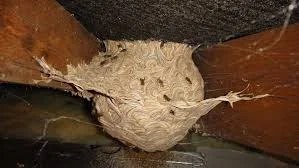When it comes to wasp control there are two common types of wasps in the UK and it is important to understand the difference between the two before the removal of a wasps nest.
Solitary Wasp
The solitary wasp is hardly noticed as they are loners and don't cluster together therefore they rarely cause much of a problem to us humans.
They reside in:
- Small nests they build themselves from wood or mud
- Holes abandoned by other insects
- Inside prey. A solitary wasp kills their prey then lays eggs inside the body, once hatched the larvae feed off the body!
- Underground tunnels. This would pose a hazard to us if we decide to walk barefoot in the garden!
Social Wasps
These are the wasps that tend to cause us the most problems with their nests population reaching a staggering 5,000 to 10,000 in the heights of summer! They build nests out of scraps of wood, Paper and cardboard mixed with their saliva to form a substance called cellulose. These nests are commonly found in eaves of the house, attics, walls, roof spaces, trees hedges and underground.
Its not all bad news. Wasps never use the same nest each year, so if you can cope with them during the spring and summer months then you can be sure that they will not return the following year. This way you can wait until they leave and just knock the nest down and discard of it. You would also have the opportunity to examine the intricate work the wasps put into building the nest if you so wish.
However if you are allergic to wasp stings, then nest is in a built up area or you have a young family the wasp nest may become a hazard and waiting for them to vacate themselves isn't an option. In this case wasp control is the only option.
Getting Rid Of A Wasp Nest
Of the two it is more likely that it is a social wasps nest causing problems meaning there will be a large number of wasps buzzing around. If you are unsure of what type of wasp you are dealing with then the best and safest option is to contact a pest control company as they are experienced in dealing with wasp nests. It is also not advised to try and deal with a wasp nest yourself if you have had a reaction to a wasp sting in the past.
Precautions
- Before attempting wasp control yourself there are several precautions you should take first.
- Make sure your wearing long sleeves, full length trousers, eye protection and try to cover your entire face.
- If you are using a chemical make sure you carefully follow instructions as some pesticides can be harmful to other wildlife, pets and humans if incorrectly used!
- Make sure you use a good quality insecticide they is designed for wasp control as not using the correct one can result in not getting rid of the wasps and instead leaving yourself with hundreds of angry wasps!
- Have necessary first aid kit to deal with any wasp stings as they can be quite painful.
- Remember unlike bees, wasps can sting multiple times!
- Wasps will attack when someone or something gets too close to their nest so be prepared.
Top Tips for Wasp Control
- If the wasp nest is in a bush you should first observe the entry and exit pattern. Then standing around 15 feet from the nest, using a good quality powdered insecticide cover the entire nest paying close attention to the exit path of the wasps.
- Wasp nests that are on the ground are fairly simple to deal with just disperse the powdered insecticide into the tunnel then leave it.
- Eaves of the house are the most common place for wasp nests and they are quite tricky to get to. The best way to get to the nest is usually from the inside of the roof space. Try to keep the attic light off as this can attract the wasps. Use a torch to locate the wasp nest then providing the nest is not too far away use a powdered insecticide. If this is too much of a big job then it is probably best to call in pest control to provide a professional wasp control service.
- Another common nesting place for wasps is air bricks as they are easy to destroy. The nest can go as deep as 6 feet under the house cavity. You should use a powdered insecticide making sure you cover all the holes, as the wasps will just use the holes without the insecticide in them. You will need to repeat this process a few time for it to take full affect. Again this type of nest requires special equipment and you may need to call in the help of pest control to ensure the wasp nest is properly dealt with.
- Wasp nests in roof voids or high up places require specialist equipment including a full protective suit so it is better to call in a professional pest control company.
If you find a wasps nest that is causing problems then don't hesitate to call Kapow Pest Control to come and and provide the appropriate wasp control service. - 01373 813 721

